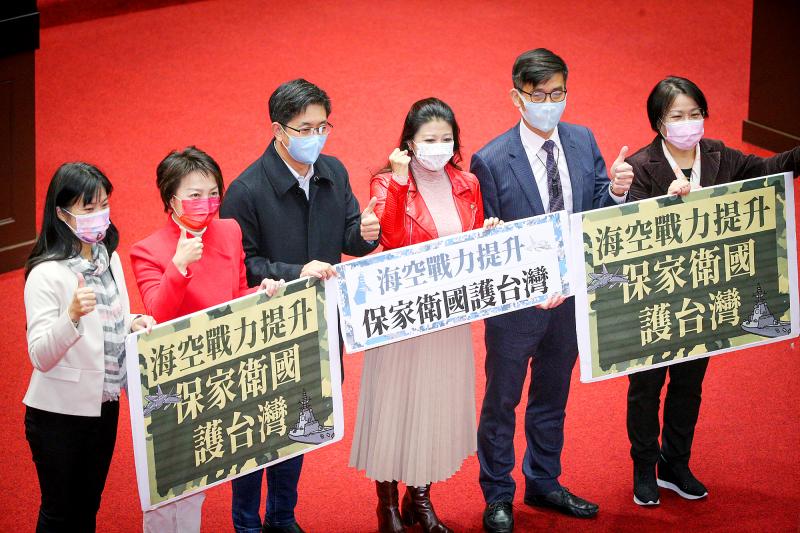The Legislative Yuan yesterday passed a NT$236.96 billion (US$8.56 billion) special budget to procure weaponry over the next five years, with the aim of enhancing the nation’s defenses against rising Chinese aggression.
The majority, to be distributed over five years and fully financed through borrowing, would go toward weapons procurements, while NT$89.69 million is to be set aside for logistics and oversight.
The final amount was on Monday adjusted down by NT$310 million during cross-party negotiations, cutting NT$300 million from the weapons allocation and NT$10 million from the logistics allocation.

Photo: CNA
Funding is to mainly go toward domestically produced armaments, especially precision missiles, high-performance warships and weapons systems for coast guard vessels.
Eight types of weapon systems are permitted: shore-based anti-ship missiles, field and ground-based air defense systems, uncrewed aerial vehicles, air-to-ground and surface-to-surface cruise missile systems, high-performance submarines and coast guard weapon systems.
The production of the Taiwan-made Tien Kung (Sky Bow), Tien Chien (Sky Sword) and Hsiung Feng (Brave Wind) series of missiles is also supported.
Under the budget authorization bill, the Ministry of National Defense is required to submit a progress report to the legislature every May that includes spending plans for the coming year.
Prioritizing locally made equipment creates a “win-win situation” for national security and the economy, the Executive Yuan said.
It is the fourth special budget passed under President Tsai Ing-wen (蔡英文). A special budget is not constrained by spending restrictions placed on the regular budget.
It also comes on top of a record annual defense budget of NT$471.7 billion for this fiscal year.
The Cabinet in September last year proposed an authorization bill for the special budget with the goal of safeguarding national sovereignty against “severe threats” posed by China.
The legislature passed the bill on Nov. 23 last year, authorizing the Cabinet to draw up a special budget of up to NT$240 billion for weapons purchases until 2026.
The Cabinet then drafted a special budget and sent it to the legislature for approval, but it stagnated in cross-party negotiations due to an opposition boycott over alleged government partiality in campaigning against the referendums held on Dec. 18.
To pass important bills left after the regular session ended on Dec. 31, the Democratic Progressive Party caucus called an extraordinary session that started on Wednesday last week and is to continue until Jan. 28.
During cross-party negotiations on Monday, a consensus was reportedly reached on most items and legislators across party lines expressed support for enhancing national defense capabilities.
Several resolutions were also passed affirming the importance of researching, developing and procuring arms to keep the nation secure; calling on contractors and manufacturers to protect defense secrets; and suggesting that the ministry conduct security assessments of related personnel and manufacturers.
A group of Chinese Nationalist Party (KMT) legislators also passed a resolution advising more judicious use of special budgets.

A magnitude 7.0 earthquake struck off Yilan at 11:05pm yesterday, the Central Weather Administration (CWA) said. The epicenter was located at sea, about 32.3km east of Yilan County Hall, at a depth of 72.8km, CWA data showed There were no immediate reports of damage. The intensity of the quake, which gauges the actual effect of a seismic event, measured 4 in Yilan County area on Taiwan’s seven-tier intensity scale, the data showed. It measured 4 in other parts of eastern, northern and central Taiwan as well as Tainan, and 3 in Kaohsiung and Pingtung County, and 2 in Lienchiang and Penghu counties and 1

FOREIGN INTERFERENCE: Beijing would likely intensify public opinion warfare in next year’s local elections to prevent Lai from getting re-elected, the ‘Yomiuri Shimbun’ said Internal documents from a Chinese artificial intelligence (AI) company indicated that China has been using the technology to intervene in foreign elections, including propaganda targeting Taiwan’s local elections next year and presidential elections in 2028, a Japanese newspaper reported yesterday. The Institute of National Security of Vanderbilt University obtained nearly 400 pages of documents from GoLaxy, a company with ties to the Chinese government, and found evidence that it had apparently deployed sophisticated, AI-driven propaganda campaigns in Hong Kong and Taiwan to shape public opinion, the Yomiuri Shimbun reported. GoLaxy provides insights, situation analysis and public opinion-shaping technology by conducting network surveillance

‘POLITICAL GAME’: DPP lawmakers said the motion would not meet the legislative threshold needed, and accused the KMT and the TPP of trivializing the Constitution The Legislative Yuan yesterday approved a motion to initiate impeachment proceedings against President William Lai (賴清德), saying he had undermined Taiwan’s constitutional order and democracy. The motion was approved 61-50 by lawmakers from the main opposition Chinese Nationalist Party (KMT) and the smaller Taiwan People’s Party (TPP), who together hold a legislative majority. Under the motion, a roll call vote for impeachment would be held on May 19 next year, after various hearings are held and Lai is given the chance to defend himself. The move came after Lai on Monday last week did not promulgate an amendment passed by the legislature that

AFTERMATH: The Taipei City Government said it received 39 minor incident reports including gas leaks, water leaks and outages, and a damaged traffic signal A magnitude 7.0 earthquake struck off Taiwan’s northeastern coast late on Saturday, producing only two major aftershocks as of yesterday noon, the Central Weather Administration (CWA) said. The limited aftershocks contrast with last year’s major earthquake in Hualien County, as Saturday’s earthquake occurred at a greater depth in a subduction zone. Saturday’s earthquake struck at 11:05pm, with its hypocenter about 32.3km east of Yilan County Hall, at a depth of 72.8km. Shaking was felt in 17 administrative regions north of Tainan and in eastern Taiwan, reaching intensity level 4 on Taiwan’s seven-tier seismic scale, the CWA said. In Hualien, the